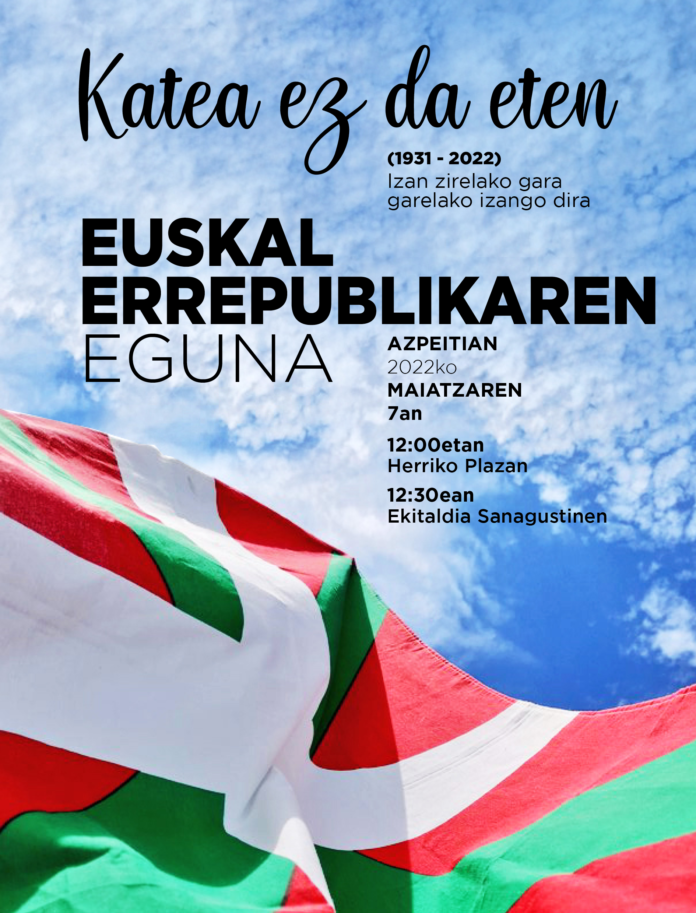The desire to have a Basque Republic is not new among Basque patriots, not something that has suddenly occurred to us this morning. On the contrary, it is a claim with a long historical tradition. In the 18th century, 130 years before the birth of Sabino Arana (founder of modern Basque nationalism), the Jesuit Larramendi wrote the following: “Why can’t the Basque language see all its speakers together, united in a single Nation, free and outside the domination of other languages and nations? Why should the three territories of Gipuzkoa, Alava and Bizkaia (and what to say about the Kingdom of Navarre) be under the rule of Castille, and the other three (Lapurdi, Zuberoa and Lower Navarre) under the rule of France?” And in another paragraph he details his independence proposal: “We will be the United Provinces of the Pyrenees… … and we will create a Republic of Basques”
After Larramendi, and before Sabino Arana was born, the lapurtarra (from Lapurdi) Dominique Garat and the zuberotarra (from Zuberoa) Agosti Xaho made similar proposals public. All of them viewed the Basque Republic outside of Spain and France.
Later, in the 20th century, an interesting historical event occurred that is quite unknown to Basque patriots and independence supporters: in April 1931, a few days after the proclamation of the Spanish Republic, some municipalities of the Basque Country under Spanish administration, invoking the right to self-determination, demanding a Basque Republic through a municipal motion. There were not a few municipalities in Gipuzkoa and Bizkaia that approved this motion, after which they sent a telegram to the Spanish President requesting acceptance of a Basque Republic.
The date of April 14, 1931 is associated by many Basques with the proclamation of the Spanish Republic. We are used to remembering that date and placing it in the Basque context to evoke the proclamation that took place in Eibar and Spanish leftists meet there every year to celebrate that anniversary. Very few people know, however, that a few days later other Basque municipalities proclaimed the Basque Republic, thus asking for a republic of their own for our nation. In Azpeitia, in Zumaia, in Bermeo, in Mundaka, in Errenteria, in Markina, In Bergara, in Lazkao, in Oñati, in Orio or in Hernani, among other towns, the political representatives approved the demand for a Basque Republic, in most cases unanimously. It is time to learn about this episode in our recent history, and to assume its importance.
The desire to achieve our own republic is not a whim of ours, but an immediate necessity. We Basques need a Basque Republic in order to have our own house, and to be in charge of that house, and not the Spanish or the French. We need a Basque Republic to build a fairer and more democratic society. And we need a Basque Republic to maintain our language, our culture and our collective identity, and to survive as a nation against the insatiable assimilationist desires of France and Spain. Txillardegi said it clearly: “I don’t know if the Basque language will be saved by its own State; but what is certain is that without a State, it will not”. If we do not achieve the Basque Republic, the Basque Country is inevitably condemned to disappear.
For all these reasons, on May 7th we will celebrate Basque Republic Day in Azpeitia. On the one hand, to recover our historical memory and to remind everyone of that historical episode of 1931, but also to socialize the need for a Basque Republic, and to highlight the validity of the message that the Azpeitia City Council and other Basque Country Councils proclaimed. The message has been passed from one generation to another. Izan zirelako gara, garelako izango dira, we say in Basque to refer to this inter-generational transmission. Long live the Basque Republic!!








